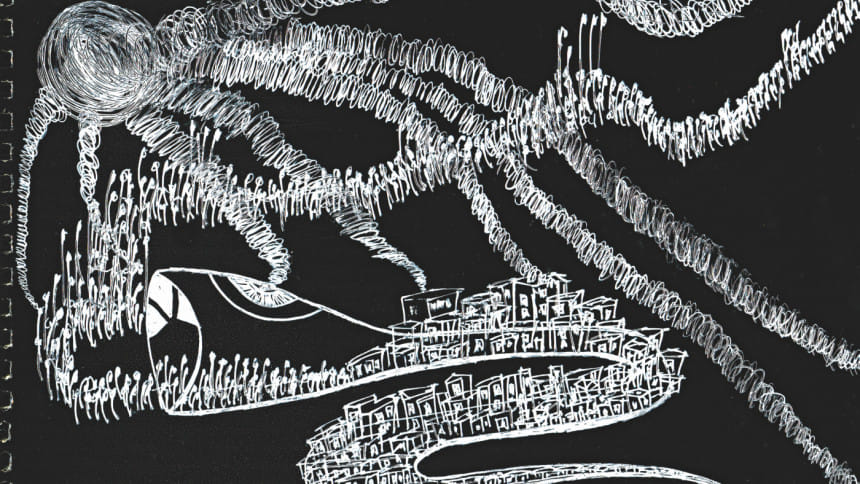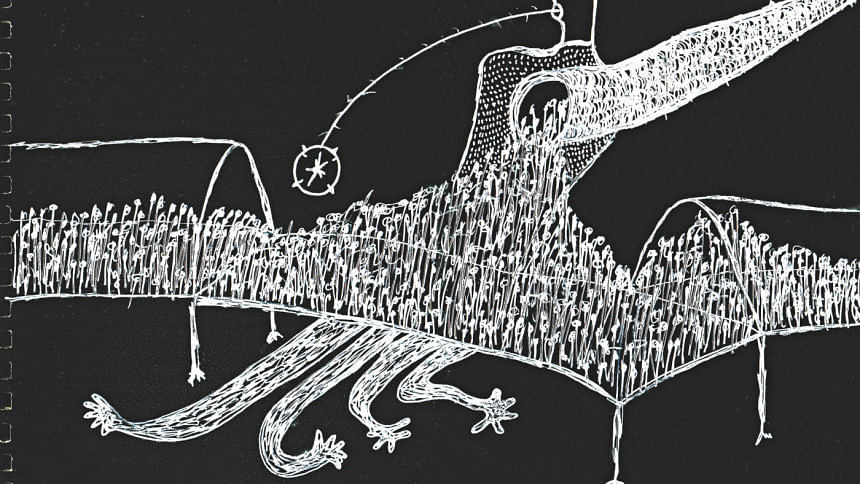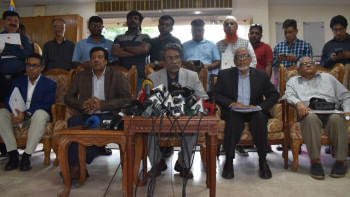In search of a therapist navigating the crazy of Dhaka and some more (m)adventures in between

I woke up with a start at 06:09 am that morning on April 10. It was the sharp ring of the alarm clock going off at this ungodly hour that made me jump up. For a brief moment I wondered why it had gone off so early before I remembered it was that day. I was supposed to go look for an old house in Elephant road and in that house was a man who promised to help make sense of all the madness unravelling around me.
This would be my first one on one meeting with Prasanta*, my new counsellor with whom I knew I shared one thing in common—our dialect.
I had met him during a training session just a week prior to this but that was the extent of our communication back then. Limited to conversations between a trainer and his audience, teaching various concepts of "stroke"–a concept in psychoanalysis–which either initiates or obstructs conversations and communication. It was intriguing, to say the very least, and got me stuck on the idea that this man could be It. Maybe he was the therapist I had been looking for—for near about a decade.
The weather was comfortable, thanks to a late night Kalboishakhi storm. With the window rolled down, we swerved left and right, right and left, until finally making it through the early morning school and office traffic and the usual Dhaka madness before I finally made it to Elephant road. This was where he stayed. Inside a dead-end alley, with bougainvillea hanging low, stood the old maroon building. And as I walked in, I noticed him standing in the verandah. Sipping tea and waving me in.
Four-part doors opened to reveal the study which also worked as a part-time office room that looked out into a tiny verandah lined with hundreds of plants, all washed a vibrant green from yesterday's rain.
It was unlike any other therapy session I had been to. The clinical, almost mechanical approach that I was prepared for and so used to from previous such experiences was removed from this one. We settled down. He, on his cane chair, while I sat opposite him and we talked and talked, like two friends catching up. I told him about my paranoia and scares, and of strange hallucinations that would get me riled up. I told him of the past year and how difficult it felt and as we talked he helped me unravel some of the more jumbled up thoughts inside my head.
I could watch it happen. As he picked on a train of thought and used his understanding of such issues to untie the Gordian knot and lay it out in front of me.
I do not remember anymore how long that first session went on for but I remember getting out of it and walking as though someone had fit clouds under my shoes. And for a brief moment, I felt in control, as though things would be better. I can assure you, I am not. Mostly because mental illnesses do not go away with one (or a hundred) session. They are like my no-tangle earphones which always get tangled up (this investment has however made it much easier to untangle—both mind and earphones).

It is difficult finding a therapist in Dhaka. Not only is there a deep-rooted stigma associated with getting help, a great part of the population is also unaware of the need for such help. There is also a dearth of such professionals in the country as well. And chances that you will get along with them are still very slim.
A long time back, I had read how finding a therapist can be akin to dating. How difficult it can be to find one that you click with and how it could still fall apart after a few dates or in this case, a few sessions. I know this to be true because of my past experience with mental health workers and therapists. It can be cumbersome, tiring, expensive and incredibly frustrating, especially when the options are so limited and catered to those who can afford it.
My journey to therapist offices and their clinics started years ago. Years before I found myself in Prasanta's room. My first brush with a mental health worker came in the form of a best friend's mother when I was both struggling to finish college and trying to balance my father's descent to madness. For a good year, she became a guide, a confidante and a therapist all at the same time. But somehow that journey ended far too quickly as she moved countries taking all her help and my best friend with her. I did not realise it then, but that would also be one of my first prolonged episodes of mental illness. I somehow scrambled through college and ended up isolating myself completely from everyone, battling abandonment issues and refusing to seek help. Mostly because knowledge happened to be so limited in this sphere. It took me another few years before I found myself in a therapist's room. This time, it would be purely professional.
I paid a hefty Tk 2,500 for an hour with the therapist. I settled down on the couch and remember feeling uncomfortable sharing anything with her. There was a clinical quality to that session. We barely looked at each other, did not share a laugh despite some stories being deeply funny, in my opinion, and I ended up leaving more upset than when I arrived.
This would not be the end of my search though. I would make a few more visits, some costing up to Tk 3,000 for an hour with an expert, which ended up giving me more anxiety in return. I am a young professional and barely make enough to support myself. I live with my parents, use their car for commuting and try to pay half of my salary so that they can use it for the family. To dish out TK 3,000 for a one-hour session made me break into cold sweats.
It was no help either that the therapist was so quick to remind me as the clock struck the hour mark that my time was up! But, I had only just gotten to the juicier bits of my mad story. I was bummed out she did not want to hear how I spent every waking moment lamenting at Instagram and Facebook pages that compared my mental illness to a broken leg. Or how I always doubted myself on the bad days and on the good days, doubted everyone else. But if my time was up, then it was up, and off I went, never to return again to this particular therapist.
Mental health services are incredibly difficult to access in Bangladesh despite the recent change in conversation. I am also not quite on board with the current narrative on mental health issues. A columnist of The Guardian wrote about it best: "The lack of stigma should be the same as telling people why your limb is in a cast. But you can't just put someone with a broken leg and an insane person side by side and expect people not to be able to tell the difference, like the Winklevoss twins or, can we be truly honest, Joanna Newsom songs."
I wish it were easier. I wish this one therapist would be my answer to these problems. But it is not. When I find myself in bed, contemplating how to be better or whether to give up altogether, I am reminded yet again how difficult these services are to come by. I cannot call my therapist in the dead of the night. That stuff is not acceptable. But should there not be some kind of help for those in need in that ungodly hour?
I also wish I could have put my name on this article without fearing the stigma but I do. And I believe real change is still far off. Until it becomes inclusive, easy to access, free for those who cannot afford and until we stop equating poor mental health with mental illnesses, change will be hard to come by.

 For all latest news, follow The Daily Star's Google News channel.
For all latest news, follow The Daily Star's Google News channel. 



Comments